WCET18 – The Thematic Experience
Published by: WCET | 11/29/2018
Tags: WCET, WCET Annual Conference, WCET Awards, WICHE, WOW Award
Published by: WCET | 11/29/2018
Tags: WCET, WCET Annual Conference, WCET Awards, WICHE, WOW Award
Hello and welcome to my yearly WCET Annual Meeting summary and review! This year I’m changing things up a bit – instead of the usual day-by-day, play-by-play, I’d like to focus on some of the themes we noticed that filtered through many sessions and hallway conversations.
If you would like to check out conference information and session materials, visit the WCET 2018 website. For session presentation materials click on “Program” in the top menu, navigate to the session of interest, and click the session title. If materials were shared with us there will be a link in the session description.
There were so many amazing tweets this year I could barely keep up! Thank you to our #WCET18 backchannel participants for an entertaining and engaging way to stay connected throughout the meeting.
A few stats of interest about this year’s meeting:
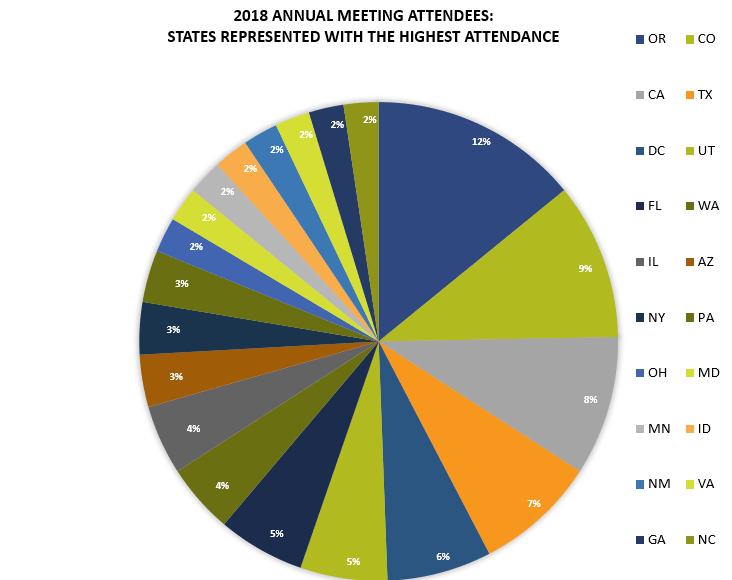
When I thought about writing this year’s meeting review, I couldn’t help but return to several discussions I held and heard about reoccurring themes that either came up in multiple different sessions or conversations during networking times and/or dinners. Here are several themes noticed this year (and some of the sessions from which they originated). It will be interesting to see if these trends continue throughout the new year (and to next year’s conferences and meetings!).
Note: sadly, I have yet to learn how to be in multiple places at once, so I asked for help in gathering content from the myriad of sessions. Thank you to the WCET team and our Steering Committee members for sharing your great session notes, thoughts, anecdotes, etc.
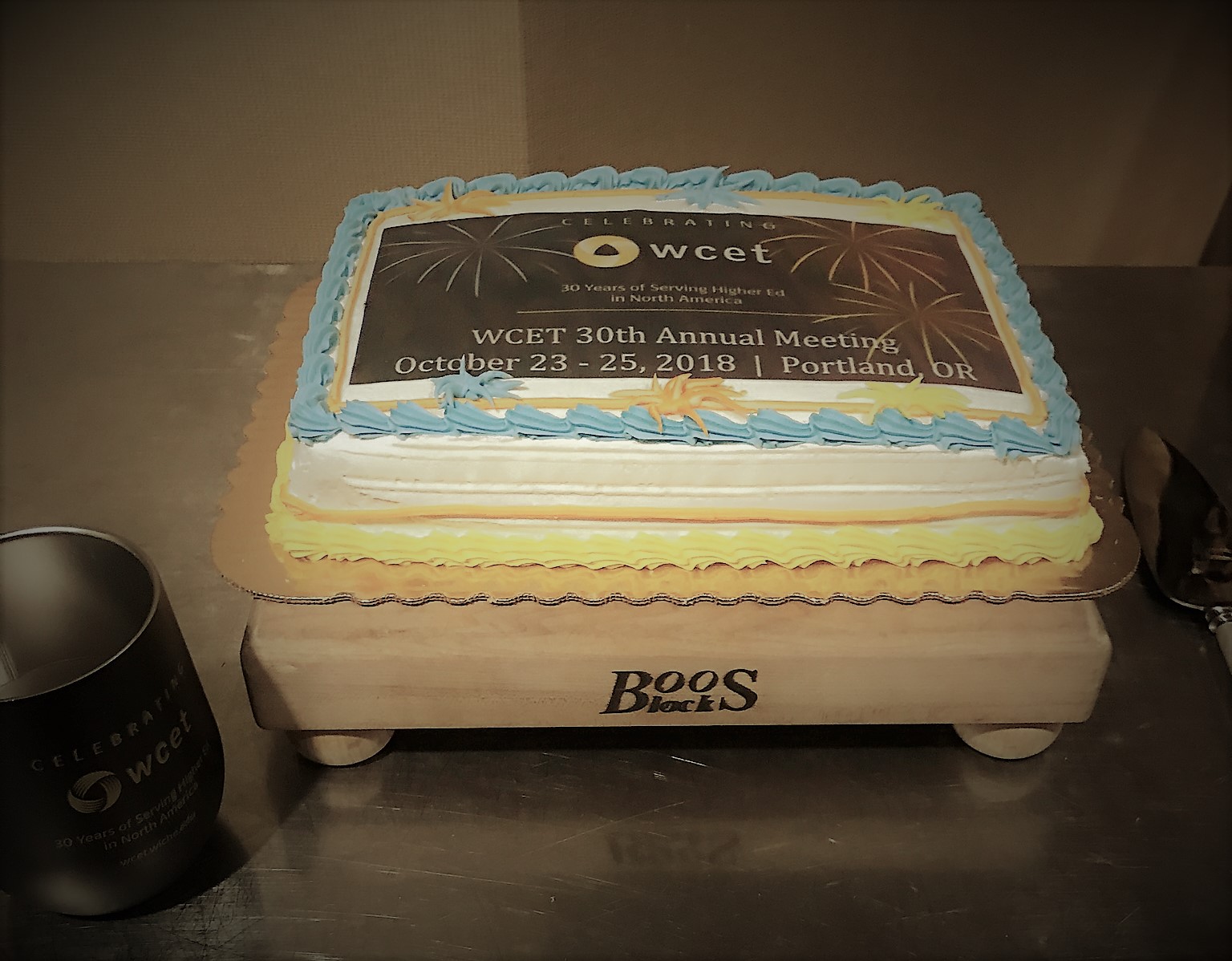
There were many sessions that touched on access for students, including our keynote from Chris Gilliard on digital redlining. Chris’s research applies the concept of redlining (“the denial of financial services to certain neighborhoods based on racial/ethic composition without regard to resident’s qualifications or credit worthiness,” taken from the Fair Housing Center of Greater Boston, accessed 2018) to the digital world. Instead of considering the implications of racism on housing and financial opportunities, Chris discussed the access to digital resources, broadband, devices, etc. and how that limits educational opportunity and advancement for minority groups. Chris also discussed how data can be used against certain individuals. Algorithms determine a lot today, from the ads we see, to offers we receive. As artificial intelligence (AI) and machine learning become more advanced (and more integrated into our society) the algorithms that determine AI behavior become ever more important. We must address how bias can influence the coding of AI and how that bias could impact specific populations in our society. Specifically, to WCET member concerns, what are the benefits and drawbacks of using imperfect analytics data when assisting students?
Another session which brought up access was “Resilient and Resourceful. Rural Community Colleges a Lifeline to Many,” where three representatives from rural community colleges in Arizona, Indiana, and Wisconsin discussed the realities of making postsecondary education available to those who are paying a “penalty for being rural.”
Our new steering committee member Ryan Faulkner, Director of Online Learning Services at the College of Eastern Idaho, had this to say about the session:
“It was inspirational to hear the lengths to which these three colleges strive to succeed in their rural environments. They discussed obstacles such as the development of accessible course content for students who, due to economics, rely solely on smartphones, or how to provide education to extremely large areas with difficult terrain and little infrastructure, and how they create special relationships within high schools through “connection coaches,” who help assist students with dual credit. In order to thrive, these colleges are adapting where possible to meet the students where they need it most.
There was a discussion regarding the “rural penalty.” In some smaller towns the cost of living is high enough and the average salary low enough that students struggle to be able to afford more than part-time schooling, slowing down time to degree. Other examples included coverage areas with poor road infrastructure, dealing with extreme weather conditions over vast areas where students could be unable to drive to campus for extended periods of time. These institutions are also finding ways to educate more rural students for local industry, and not so much for degree attainment.”
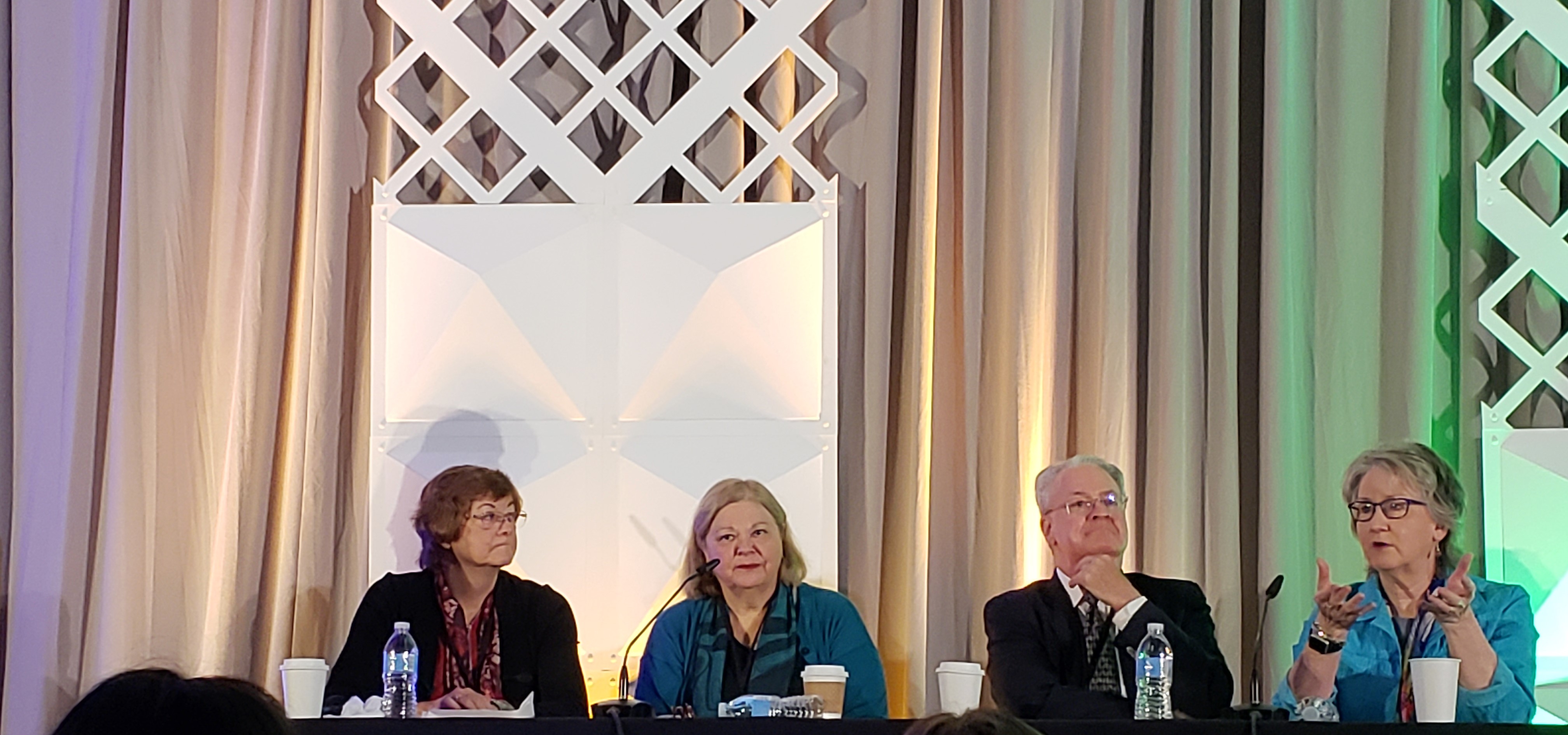
Another general session touched on the inclusion, access, and support of our military affiliated students in higher education. Our presenters discussed current education experiences supported by the Department of Defense for veterans, from career options to education or certification in various fields. A new online guide helps students determine what they want to do with their lives after leaving the service and choose the educational path that will get them to their goal. We also discussed ways that we might help veterans who are taking online courses, especially when it comes to working toward and increase in the Basic Housing Allowance (BHA) for online students (currently this allowed is reduced if they take courses online). The presenters discussed some of the challenges for supporting these students (whether they are online or on-campus), including the need for innovative tutoring and student support services, and examples of colleges and universities that excel in assisting this important student population.
Accessibility for students, faculty, and staff came up several times during sessions and conversations, from discussions on technology use in the classroom, adaptive courseware implementation, or strategies for procuring accessibility software and hardware for your institution. As part of our year-long focus on accessibility, WCET and the Online Learning Consortium (OLC) have collaborated on several presentations, webinars, and blog posts on this important topic. One of these presentations focused on the procurement process (whether formal purchases or the decisions made every day by faculty and administrators) and different approaches that individuals and institutions can use to ensure technology tools are useful by everyone. Check out the related WCET Frontiers blog on accessible procurement by Cyndi Rowland.
There were several sessions focused on adaptive technologies and adaptive learning. The session “I Already Know This!” Using Adaptive Technologies to Teach Tech-Savvy Students” focused on accelerating adoption of adaptive courseware specifically for first-generation, underserved populations. Several institutions gave examples of how they are implementing adaptive courseware (Oregon State University, Portland State University, Northern Arizona University). Again, accessibility also came up in this session (how can we work with campus support areas to ensure accessibility of the courseware?).
The Association of Public and Land-grant Universities (APLU), along with members of the Every Learner Everywhere network, created an implementation toolkit to assist institutions in the implementation of adaptive courseware. Members of this team presented at the Annual Meeting on the toolkit, a major takeaway being a reminder that adaptive courseware should be more about pedagogy change, not about specific software available on the market today. The Toolkit walks users through establishing support, discovering available tools, initial design of adaptive programs, development, pilots, and scaling. Check out the guide.
Adaptive learning can be effective for small or large classes. In fact, Georgia State presented on scaling courseware, in their case reaching over 2,500 students annual over 12 sections and with 12 instructors. Through this work, Georgia State has seen improvement in student outcomes (lower Drop, Fail, Withdrawal rates) and the courses are rated highly by faculty and students alike).
There were at least six sessions on competency-based education (CBE) at this year’s annual meeting. These sessions provided examples of current CBE pilots and programs ongoing at higher education institutions and lessons learned during implementation of such programs. For example, Texas A&M University’s programs are 7-weeks long and 100% online, each of the courses were created in collaboration between faculty and individuals actually working in each related field. Presenters suggested establishing Key Performance Indicators KPIs) early in the program and discussed the usefulness of their in-house data dashboard, which included historical views of data, demographics of current students, student performance, completion information, comparisons between various groups/courses, and a reporting function.
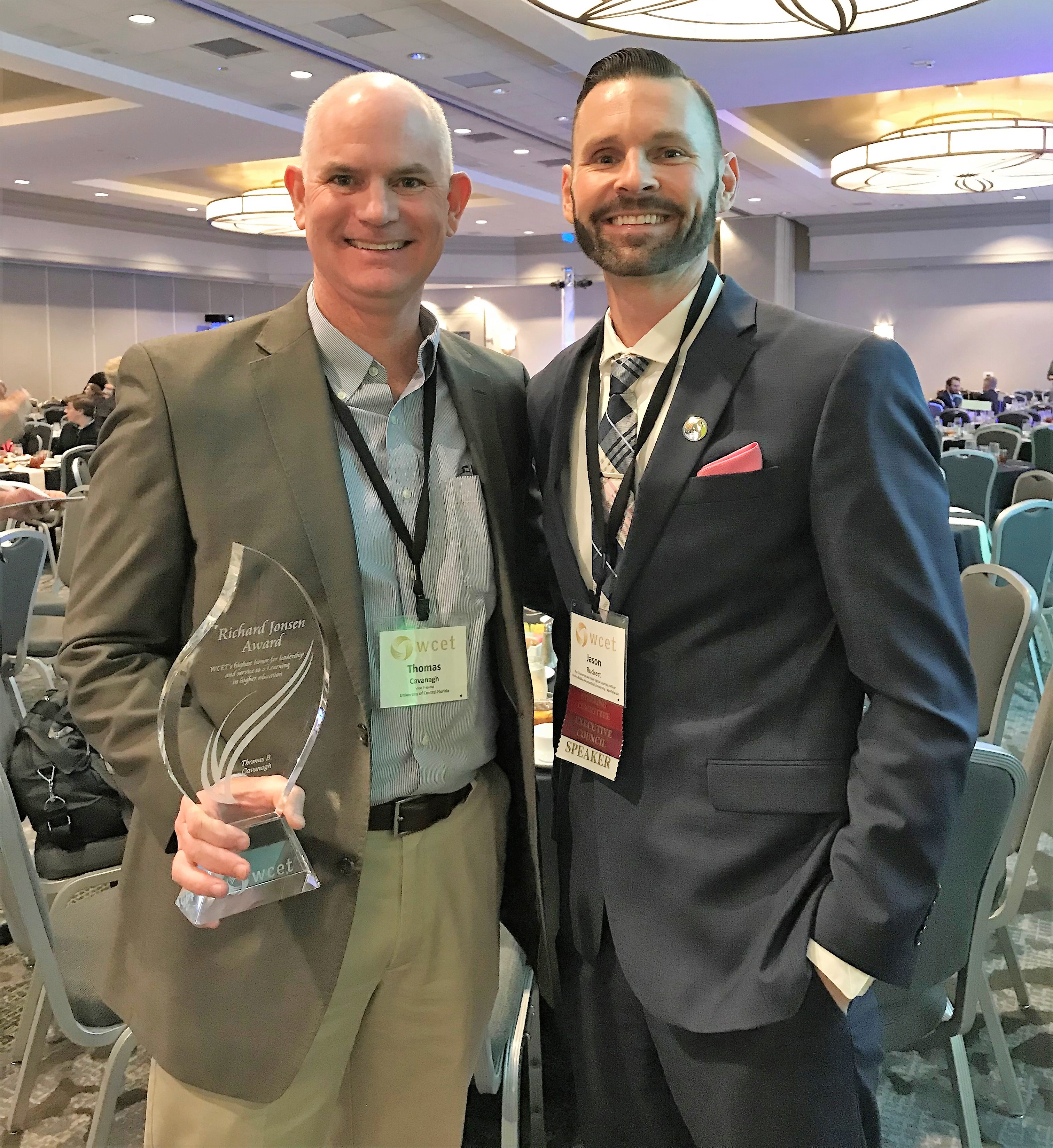
This theme was brought to me by Russ Poulin, our Director of Policy and Analysis. The WCET Steering Committee and Executive Council met in a joint session on Monday prior to the Annual Meeting. One of their main tasks was to select the priorities for WCET for the coming year (we gave them a list of 15 to narrow down). The group added their own ideas to our list, and one topic specifically ended up near the top of our priorities for next year: to learn more about the emerging growth of non-accredited providers.
On Tuesday, during the workshop on multi-institution consortia and systems, John Opper (Executive Director, Distance Learning and Student Services, Florida Virtual Campus) presented on “future proofing higher education.” Among the pressures facing colleges and universities are the 500+ non-accredited providers serving millions of students in online, blended, and face-to-face modes.
These providers are many things: competitors, part of the solution to reaching more students, and even possible partners to traditional institutions. But what does this all mean for higher education? Watch for WCET and our members to provide more information on this growing trend.
There have been several recent actions involving the U.S. Department of Education that caught the interest of Annual Meeting attendees. Chief among them is the upcoming negotiated rulemaking process that will cover a long list of items, including accreditation, definition of the credit hour, state authorization, competency-based education, barriers to innovation, regular and substantive interaction and more. There’s lots of speculation that the Department wishes to focus accreditation on student outcomes. There also seems to be interest in opening federal financial aid to different types of programs, including short programs, those offered by currently non-accredited providers, and partnerships between colleges and businesses to offer programs.
WCET has a keen interest in updating you on the progress of these negotiations and supplying recommendations on possible outcomes. Watch for more in upcoming communications.
I asked Kara Monroe, Provost and Senior Vice President at Ivy Tech Community College and member of the WCET Steering Committee, what she thought about this year’s Annual Meeting:
“I began attending WCET Annual Meetings in 2016. I remember the keynote addresses and main panel speakers from every plenary presentation I’ve had the opportunity to attend. As I think back on this year, with the context of now three annual meetings as a backdrop, what comes through for me is a focus not on technology but on student success – particularly thinking about and bringing to the forefront groups of students who aren’t well represented in the audience and are sometimes minority voices in higher education. This year we had the opportunity in the keynote to focus on digital redlining and the impact on minority populations. For me, the concept of redlining was new, and underscores the importance of educating ourselves on and then taking action on the impact of the policies and processes on which each of us has input and on how they can be used to remove barriers – both physical and policy. Our policies and processes should build bridges, not walls.”
As we plan and attend these meetings each year, even as we come up with fun events, try to find unique and practical swag items, make reservations for the group dinners, or extend invitations for networking events, our focus is how can we make sure that the end all goal is student success. We hope we accomplished this through our session selections, specifically our keynote invitation this year, and that you left filled with ideas to impact the success of current and future higher education students.
One of the more touching gatherings was the celebration of Mollie McGill’s 30 years with WICHE.
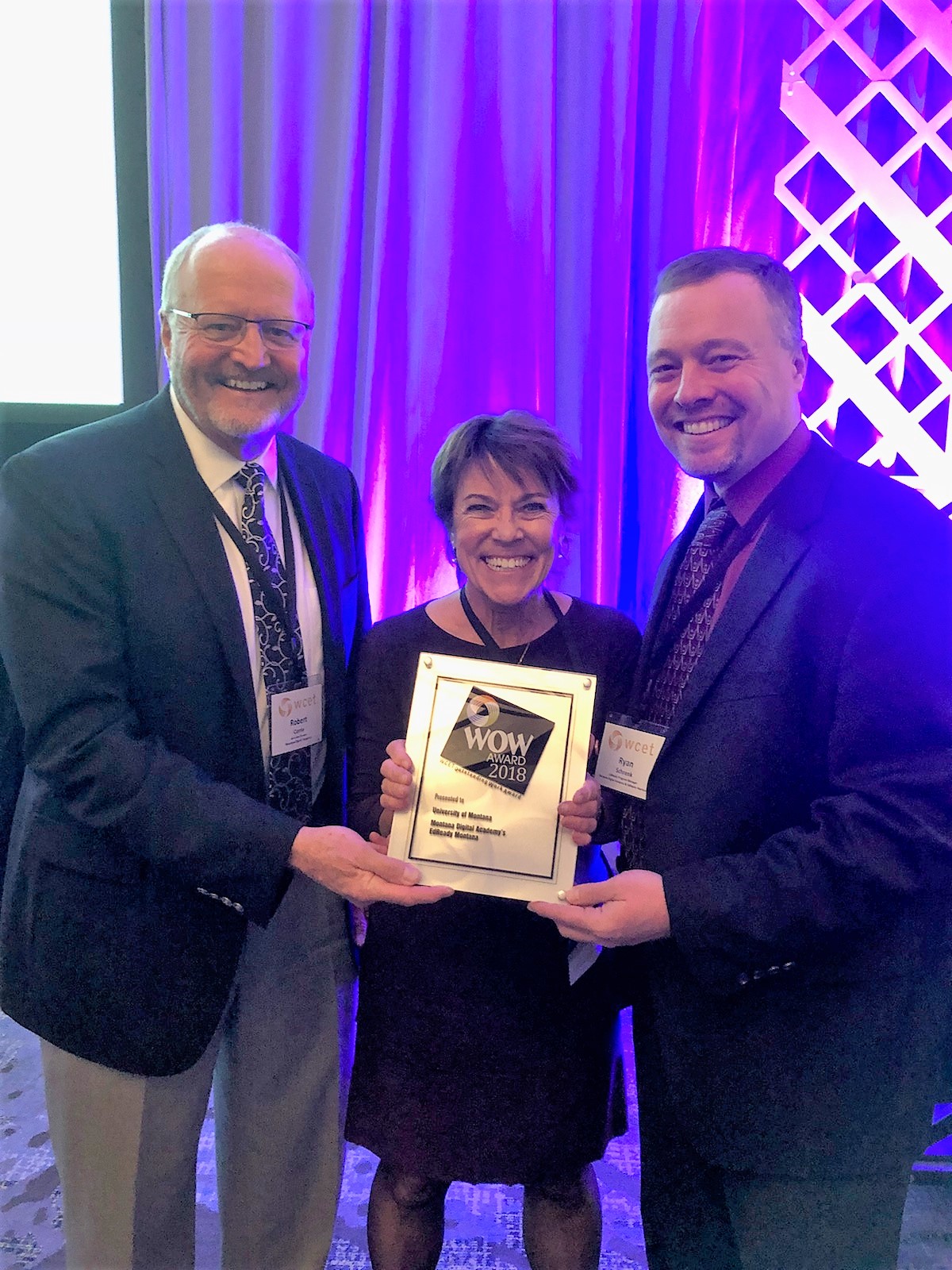
She was surprised with slide shows, commemorations via video, and a champagne toast. Mollie coordinated the WICHE team that developed what is now WCET. Her spirit is in everything we do. We love you Mollie!
What a celebration of our 30th Annual Meeting and birthday, thank you for joining us for the ride!
Aren’t you curious about what we’ll do next year? Mark your calendars now for WCET 2019 in Denver, CO (November 5-7) and WCET 2020 in Indianapolis, IN (October 13 – 15)!
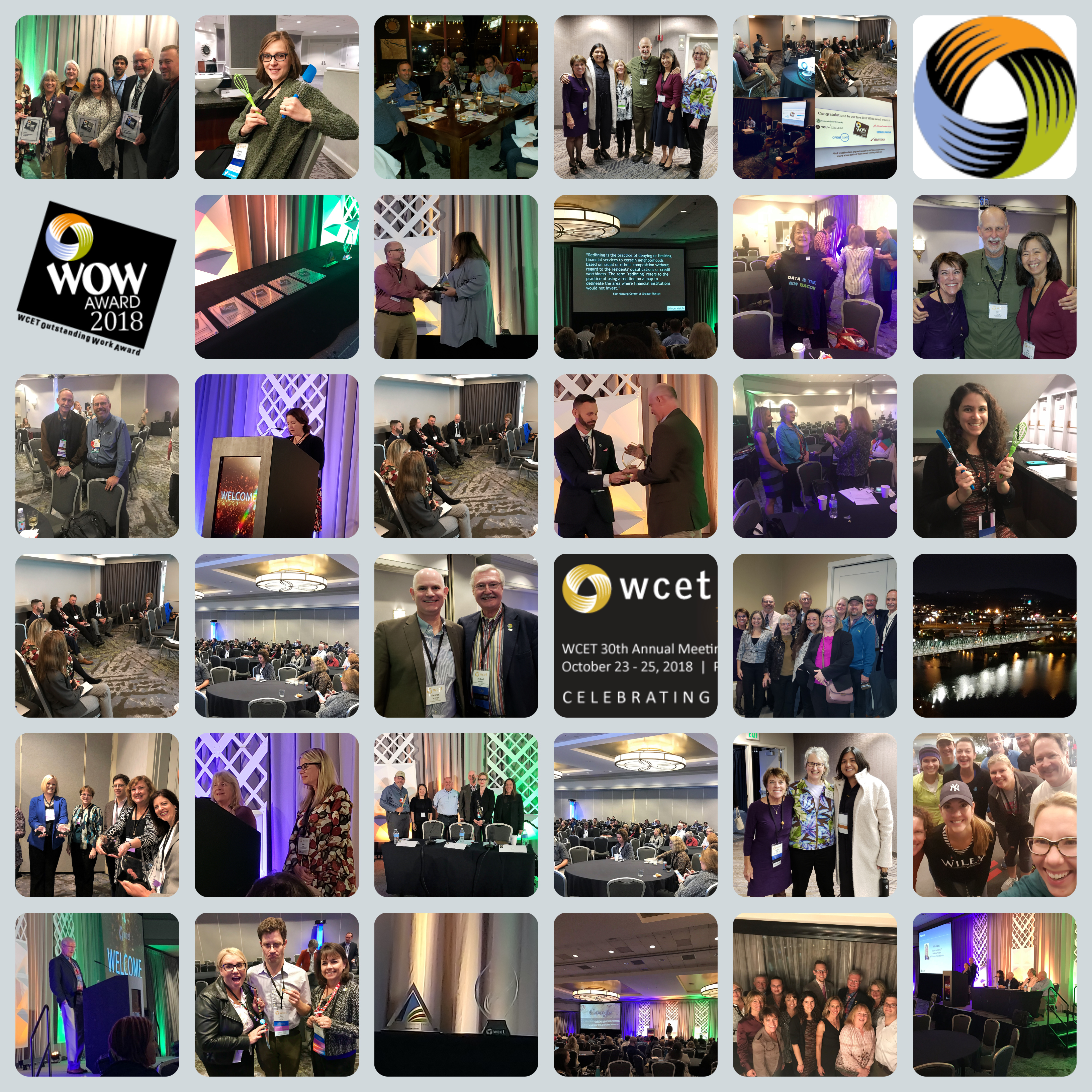
Enjoy your day,
– Lindsey, WCET

Lindsey Downs
Manager, Communications
WCET – WICHE Cooperative for Educational Technologies
ldowns@wiche.edu
@lindsey0427

1 reply on “WCET18 – The Thematic Experience”
Great summary, thank you! Wasn’t able to attend but appreciate getting the key themes. Very useful to benchmark against.